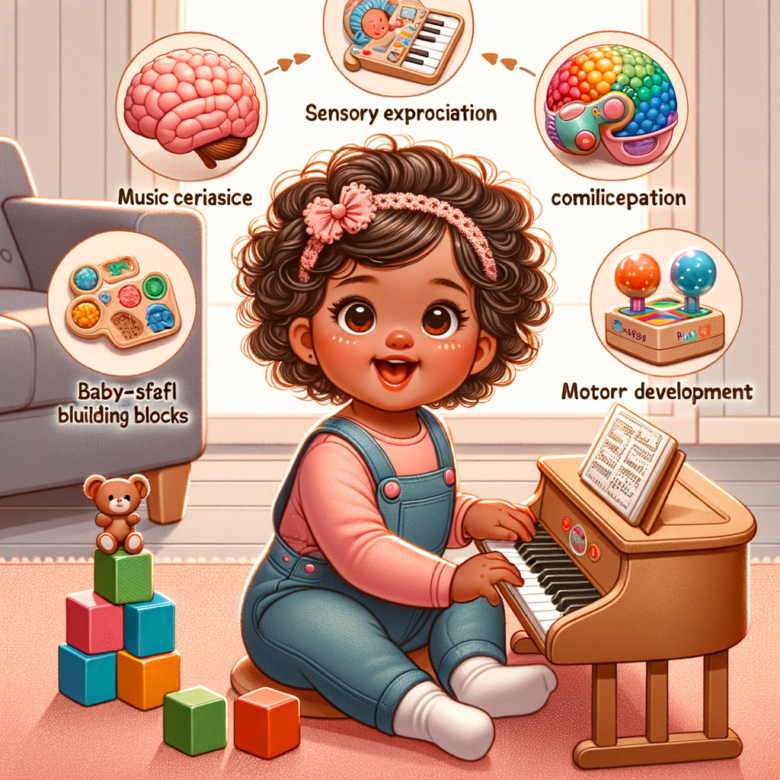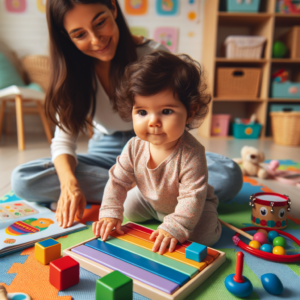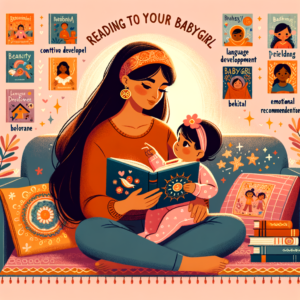Your babygirl’s brain is like a sponge, rapidly developing and absorbing information from her environment. The first few years of life are crucial for brain development, and as a parent, you play a vital role in stimulating this growth. This comprehensive guide will provide you with a variety of engaging activities to boost your babygirl’s cognitive, sensory, and motor skills development.
Understanding Brain Development
Before diving into activities, it’s important to understand that:
- Brain development is most rapid in the first three years of life
- Experiences and interactions shape brain connections
- Repetition strengthens neural pathways
- Multi-sensory experiences are particularly beneficial
Age-Appropriate Activities
0-3 Months
At this stage, your babygirl is primarily developing her sensory abilities.
- High-Contrast Visual Stimulation
- Show black and white patterns or high-contrast images
- Move objects slowly from side to side in her field of vision
- Tummy Time
- Place her on her tummy for short periods while awake
- Use mirrors or toys to encourage head lifting
- Talking and Singing
- Speak to her often, describing what you’re doing
- Sing lullabies and nursery rhymes
3-6 Months
Your babygirl is becoming more interactive and aware of her surroundings.
- Reach and Grab Games
- Dangle safe objects within her reach
- Encourage her to grasp and explore different textures
- Simple Hide and Seek
- Partially hide a toy under a blanket
- Encourage her to find it
- Mirror Play
- Show her her reflection
- Make faces and encourage imitation
6-9 Months
At this stage, your babygirl is likely becoming mobile and more curious.
- Stacking and Knocking Down
- Use soft blocks or cups for stacking
- Demonstrate and encourage knocking them down
- Sensory Bins
- Create safe bins with items of various textures
- Supervise as she explores different sensations
- Simple Puzzles
- Introduce shape sorters or simple puzzles
- Guide her hand to show how pieces fit
9-12 Months
Your babygirl is developing more fine motor skills and understanding cause and effect.
- Container Play
- Provide containers and objects to put in and take out
- Demonstrate and encourage filling and emptying
- Simple Instructions
- Give one-step instructions like “clap hands”
- Praise her efforts to follow directions
- Music and Movement
- Play music and demonstrate simple movements
- Encourage her to move or dance along
General Brain-Boosting Activities
These activities can be adapted for various ages:
| 1. Reading Together |
|---|
- Read books daily, pointing out pictures and making sounds
- Let her touch and explore board books
- Outdoor Exploration
- Take walks in different environments
- Describe what you see, hear, and feel
- Water Play
- Supervised splashing in a shallow bath or bin
- Introduce floating toys and pouring activities
- Finger Painting
- Use edible paints for safe sensory play
- Encourage exploration of colors and textures
- Peek-a-Boo
- Play peek-a-boo with your hands or objects
- This helps develop object permanence
Creating a Stimulating Environment
- Rotate Toys
- Keep a selection of toys out of sight
- Rotate them regularly to maintain novelty and interest
- Safe Exploration Space
- Create a baby-safe area for free movement and exploration
- Include a variety of safe objects with different textures and colors
- Limit Screen Time
- The American Academy of Pediatrics recommends no screen time before 18 months
- After 18 months, choose high-quality programming and watch together
The Importance of Responsive Caregiving
Remember that the most important factor in your babygirl’s brain development is responsive, loving care. Respond to her cues, offer comfort when needed, and engage in plenty of face-to-face interaction.
Frequently Asked Questions
Q: How much time should I spend on these activities each day? A: Short, frequent sessions throughout the day are best. Follow your babygirl’s lead and interest.
Q: What if my babygirl doesn’t seem interested in an activity? A: Every baby is different. Try the activity again another time or move on to something else. Never force an activity.
Q: Can I overstimulate my babygirl? A: Yes, it’s possible. Watch for signs of overstimulation like fussiness or looking away, and provide calm, quiet time when needed.
Q: Do I need special toys for brain development? A: While educational toys can be helpful, everyday objects and loving interaction are the most important tools for brain development.
Conclusion
Stimulating your babygirl’s brain development doesn’t require expensive toys or complicated activities. The key is consistent, loving interaction and providing a variety of sensory experiences. Remember, every moment is a learning opportunity for your little one.
As you engage in these activities, pay attention to your babygirl’s cues and interests. Follow her lead, and don’t be afraid to get silly and have fun together. The bond you create through play and interaction is just as important as the cognitive skills she’s developing.
Remember, you are your babygirl’s first and most important teacher. By providing a loving, stimulating environment and engaging in these activities, you’re setting the foundation for a lifetime of learning and growth. Enjoy this special time of discovery and development with your little one!



